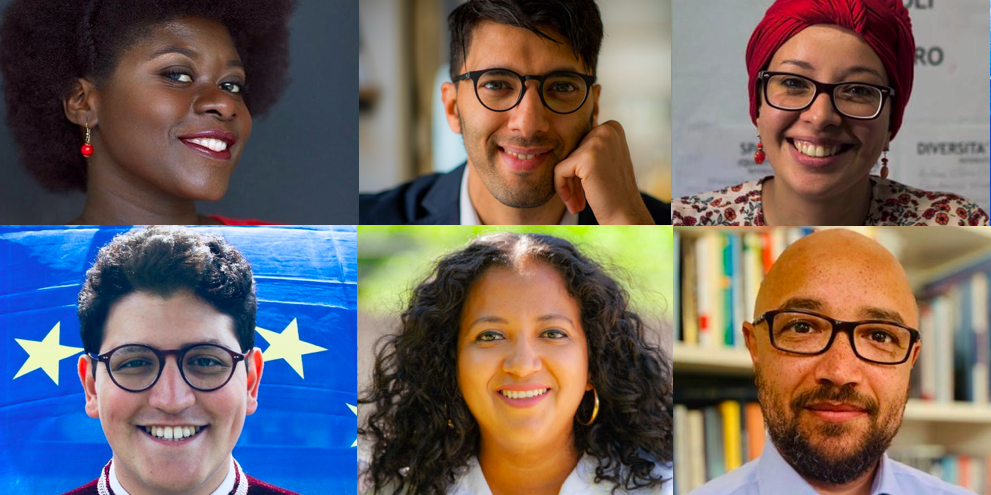It’s all about leadership, they say. About skills and vision. There are doctors, start-uppers, artists, politicians, teachers, activists and writers among the almost three million under 35-year-old second generation people present in Italy, but who are not always formally Italian. Talents trying to change society for the better by putting their necks on the line.
So NRW decided to bring together the most interesting voices among the new Italians to talk about leadership, and we asked them: How to be a leader in multicultural society and why?
Let’s talk about why
Abderrahmane Amajou, born in Morocco in 1986 and Italian by adoption from the age of 6, is the coordinator of Slow Food International and is part of the Transatlantic Inclusion Leaders Network of the German Marshall Fund from the US. “People with an important background, a mix of Italian and another country of origin, can be the solution to so many problems in our society today,” he said, to answer the “why?” question.
Talking to them about leadership is necessary, to make them feel more part of society, to take part in change and feel responsible for themselves
Hilda Ramirez, a human rights activist born in Ecuador 29 years ago and in Italy since she was 7, echoes what Abderrahmane says. Today she is the president of the Multiethnic Association for Human Development Cooperation in Genoa, as well as adviser to CoNNGI, the National Co-ordination of New Italian Generations: “It is important to talk about leadership and new generations because it is time to understand that we are not the exception, but the rule. ‘New generation’ means having a migratory background, enriched language skills, two cultures, two worldviews. This translates into a positive socio-economic impact for the whole of society, in Italy”, she notes.
But why is this the right time to talk about it? Matteo Matteini, 54 years old, of Italian and Congolese origin, expert in social innovation for multilateral, national, regional and local organizations, and co-founder of a series of social impact start-ups such as Vitality Onlus reminds us that “This is, in many ways, a generative moment. The background of a world that we believed to be solid has been destroyed, and it is necessary to lay the foundations for a new way of life”.
For this reason, people who have in their background a history of change, for example a migratory background, are the ones that need to be looked at most carefully, because to regenerate you need new roots
Politics and commitment
In addition to being part of the Global Shapers, the youth network associated with the World Economic Forum, Anass Hanafi is committed on many fronts: he is studying Law in Turin, he is a member of TILN (Transatlantic Inclusion Leaders Network), also organized by the German Marshall Fund, and the co-founder of Nili, the Italian Network of Leaders for Inclusion. His recipe, he explains, is simple:
If you’re not at the table, you’re on the menu, goes an English saying, very effectively. Young people need to take back their seats at the table, learn to sit at the table, and by that I mean to understand the mechanism for activating themselves in order to be elected and bring the issues of their communities to the decision-making tables
For a country to be truly inclusive, it must provide for the participation of minorities through targeted policies, agrees Marwa Mahmoud, an Italo-Egyptian raised in Italy who is a member of the council in Reggio Emilia. “We need to have practices that put citizens with migratory backgrounds, therefore with linguistic, cultural and spiritual diversity, within the ruling and political class. We can achieve this through voting in elections, having a presence on the boards of directors, in the representation of parties at national level and in other contexts where we are not used to seeing cultural diversity”.
To represent, represent yourself
Here’s the key: become a role model and inspire others. “Only when you become leaders of yourself can you become a leader for someone else. But before you follow someone else, it is essential to learn to choose your own references”. These are the words of Boris Veliz, born 27 years ago in Guayaquil, Ecuador, and adopted by Milan where he graduated from the Academy of Fine Arts in Brera. “Art cancels out social and cultural differences”, he explains, noting that there are countless areas through which leadership can express itself.
Evelyne Sarah Afaawua, the young Italo-Ghanaian entrepreneur who created the brand Nappytalia Eco Bio Cosmetics, was born in France and arrived in Italy at the age of one. While studying at Bocconi University in Milan she began to nurture the idea of her own company of products for afro hair. “I wanted to see my image reflected and hair is a means to express identity, authenticity and naturalness. Nappytalia aims to highlight those for people in Italy who do not yet have representation”.
Translated by Adam Clark


